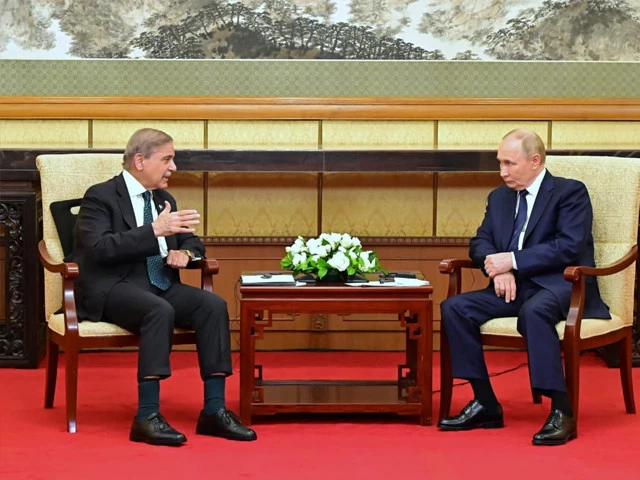Pakistan and Russia pledge stronger ties in trade, energy and regional connectivity
Prime Minister Shehbaz Sharif and Russian President Vladimir Putin met on Tuesday in Beijing, where both leaders reaffirmed their commitment to strengthening bilateral cooperation in trade, energy and regional connectivity. The meeting took place on the sidelines of upcoming events in China.
Shehbaz lauded Putin’s role in advancing Pakistan-Russia relations, noting that ties had improved significantly in recent years based on shared interests. He recalled their previous discussions at the Shanghai Cooperation Organisation (SCO) summit, where both sides agreed to increase high-level exchanges and expand collaboration.
The prime minister highlighted newly signed protocols covering agriculture, iron and steel, energy and transport, emphasizing that these agreements would serve as a foundation for closer economic engagement.
Shehbaz also underscored the importance of a proposed trade corridor linking Belarus, Russia, Kazakhstan, Uzbekistan, Afghanistan and Pakistan, calling it a gateway to regional prosperity. Acknowledging Russia’s longstanding partnership with India, he stressed that Pakistan likewise aimed to develop strong and balanced relations with Moscow.
He cited Pakistan’s recent imports of Russian crude oil, which significantly boosted bilateral trade, as an encouraging sign of expanding commercial cooperation. “Together, both countries will continue to push forward in commerce and trade,” he remarked.
President Putin described Pakistan as a “traditional partner in Asia” and expressed Moscow’s appreciation for the enduring friendship. He also extended condolences over recent natural disasters in Pakistan and voiced confidence in the country’s resilience.
Both leaders discussed parliamentary exchanges and cooperation at the United Nations, where Pakistan is currently serving as a non-permanent Security Council member. Putin invited Shehbaz to attend the SCO Heads of State summit in Russia this November, to which the prime minister responded positively.
Earlier in Beijing, Shehbaz held a meeting with Chinese President Xi Jinping at the Great Hall of the People. The two leaders reaffirmed their commitment to advancing the China-Pakistan Economic Corridor (CPEC) into its next phase, focusing on five new corridors that will expand collaboration in key sectors.
Shehbaz called CPEC the “flagship project” of President Xi’s Belt and Road Initiative (BRI), stressing that the initiative was vital for Pakistan’s economic transformation. He appreciated China’s steadfast support for Pakistan’s sovereignty, integrity and development, while Xi assured continued assistance as the upgraded CPEC moves forward.
The prime minister arrived in Tianjin on Saturday to attend the SCO Council of Heads of State summit, which concluded on September 1. Addressing the forum a day earlier, he urged dialogue and diplomacy over confrontation in resolving disputes, including concerns over India’s unilateral suspension of the Indus Waters Treaty (IWT).
“We respect all international and bilateral agreements and expect reciprocity from SCO members,” Shehbaz stated, adding that equitable access to water resources under existing treaties would strengthen regional cooperation.
The SCO comprises China, India, Russia, Pakistan, Iran, Kyrgyzstan, Tajikistan, Kazakhstan, Uzbekistan and Belarus, with 16 other states engaged as observers or dialogue partners.



